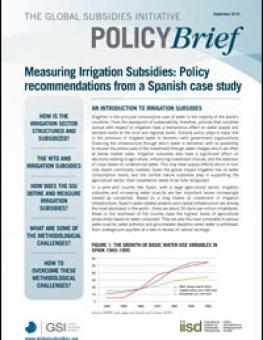
Measuring Irrigation Subsidies: Policy recommendations from a Spanish case study
There is currently no common methodology for measuring irrigation subsidies at the national level. A concise set of defined parameters for the measurement of irrigation subsidies is needed to make any national estimates internationally comparable.
GSI has laid the foundations for the adoption of a common method for quantifying irrigation subsidies which draws on the main components of the Net Cost to the Supplier approach. This focuses on measuring identifiable government expenditures as reported in budget reports and official documentation.The methodology was used to estimate irrigation subsides in Spain. The study estimated subsidies to irrigated agriculture in Spain are between €906 million and €1.120 million per year based on conservative assumptions.This policy brief draws out the lessons learned from this study and provides recommendations on how to overcome some of the more general methodological challenges analysts face when quantifying irrigation subsidies, such as setting an appropriate price for water use and economic principles for valuing investments of capital for irrigation infrastructure. It also provides a number of specific recommendations for policy makers in Spain to help improve the level of publicly available information on subsidy programs.
You might also be interested in
Assessing the Cost-Effectiveness of Renewable Energy Deployment Subsidies: Solar PV in Germany and Spain
This study reviews deployment subsidies for solar PV in two European countries, Germany and Spain. It forms one of a series of three looking at the cost-effectiveness of renewable energy deployment subsidies, each one focusing on different technologies and countries.
Biofuels At What Cost? A review of costs and benefits of Spain's biofuel policies
This report evaluates some of the principal issues associated with Spain's biofuels industry, support policies, employment creation, emission abatement and the role of biofuels and other renewable transport technologies in meeting EU renewable energy targets.
The Cost of Fossil Fuel Reliance
Government support for fossil fuels reached at least USD 1.5 trillion in 2023, new data shows.
Increased Support Needed to Achieve India's Clean Energy Goals
India is on track to achieve many of its 2030 clean energy goals but needs to step up government support measures to accelerate the deployment of offshore wind, electric vehicles, and green hydrogen, according to a new report.